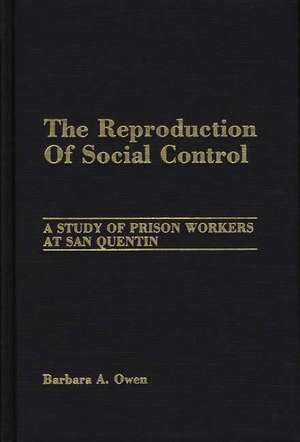The Reproduction of Social Control: A Study of Prison Workers at San Quentin
Autor Barbara Owenen Limba Engleză Hardback – 7 aug 1988
Owen's study is of excellent quality and should be considered required reading for students of these topics. Ultimately this book will be ranked as a significant sociological study of the correctional officer for its pioneering application of the interactionist theoretical perspective to this increasingly visible, yet still little-understood, occupational group. "Criminal Justice Review"
Based on interviews with 125 prison workers and participant observation, this in-depth study examines the prison worker's world as a foundation for a theory of social control. By analyzing the intricate relations among the workers themselves rather than among the prisoners, Barbara Owen posits that social control arises through the combination of interaction, power, and meaning. Owen argues that the motives of workers are practical, rather than pathological as suggested by earlier research. She focuses her study on the social context of the prison shop floor--challenging the accepted idea that prison work is difficult because of the prisoners. The findings indicate that the problems of the prison workers are structurally induced and arise from interaction with co-workers rather than with prisoners.
Preț: 343.80 lei
Preț vechi: 555.21 lei
-38% Nou
65.78€ • 68.87$ • 54.43£
Carte tipărită la comandă
Livrare economică 05-19 aprilie
Specificații
ISBN-10: 0275928187
Pagini: 168
Dimensiuni: 140 x 216 x 11 mm
Greutate: 0.35 kg
Editura: Praeger
Colecția Praeger
Descriere
Based on interviews with 125 prison workers and participant observation, this in-depth study examines the prison worker's world as a foundation for a theory of social control. By analyzing the intricate relations among the workers themselves rather than among the prisoners, Barbara Owen posits that social control arises through the combination of interaction, power, and meaning. Owen argues that the motives of workers are practical, rather than pathological as suggested by earlier research. She focuses her study on the social context of the prison shop floor--challenging the accepted idea that prison work is difficult because of the prisoners. The findings indicate that the problems of the prison workers are structurally induced and arise from interaction with co-workers rather than with prisoners.



















